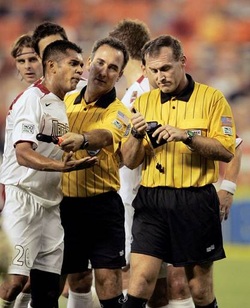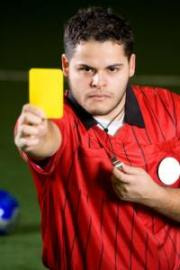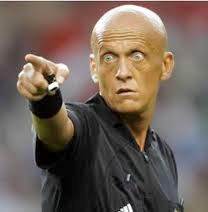- HOME
- MINDSET
- T-SHIRTS
- JUST4KEEPERS GOALKEEPER TRAINING
- UNDERSTANDING GOALKEEPING
- LAWS of SOCCER
- Law 1: The Playing Field (Pitch)
- Law 2: The Ball
- Law 3: The Number of Players
- Law 4: The Player's Equipment
- Law 5: The Referee
- Law 6: Assistant Referee
- Law 7: The Duration of the Match
- Law 8: The Start and Stop of Play
- Law 9: Ball in and out of Play
- Law 10: The Method of Scoring
- Law 11: The Offside
- Law 12: Fouls and Misconduct
- Law 13: Free Kicks
- Law 14: Penalty Kicks
- Law: The Throw In
- Law 16: The Goal Kick
- Law 17: The Corner Kick
- FIFA
- WOMEN'S SOCCER
- 2014 WORLD CUP
- 2010 WORLD CUP FINAL
- LIVE SCORES and LEAGUE STATISTICS
- BLOG
- USING UNDERSTANDING SOCCER
- MLS
- WNSL
- LEAGUE PLAY
- ANATOMY OF A GAME
- SOME BACKGROUND
- OFFENSE
- DEFENSE
- YOUTH SOCCER
- HISTORY OF SOCCER
- GEORGE VECSEY
- REGIONAL & INTERNATIONAL PLAY
- SOCCER TERMINOLOGY
- BOOKS / REFERENCES
- FEEDBACK / QUESTIONS
- SOME PERSPECTIVES
- PHOTO GALLARY
- FORUM
- BREAKAWAY VIDEO
- USA SOCCER
- JEN'S MOTH
Questions & Comments
The Referee
The Third Team on the Field

Referees and their assistants are the third team on the field and equal in importance to the two teams. They continually upgrade their skills through vigorous mental and physical training. In addition to enforcing the rules and controlling the game, good referees are masters of psychology who also must utilize common sense. This will explored in greater detail below.
The Referee's Role is to Control the Game

The main role of a soccer referee is keep control of the game and to insure that the players respect the official rules for soccer. Also, to punish any violations. A player committing a foul can be punished by the referee by rewarding the opposing team a direct, indirect or penalty kick. A player can be awarded a yellow or red from the referee for more serious fouls.
A player receiving a red card is sent off and must immediately leave the pitch. A player who accumulates 2 yellow cards in the same match will automatically receive a red card and be sent off.
A player receiving a red card cannot play in his team's next scheduled game.
In tournament play, a player receiving a yellow card in two consecutive games cannot play in his team's next scheduled game.
A player receiving a red card is sent off and must immediately leave the pitch. A player who accumulates 2 yellow cards in the same match will automatically receive a red card and be sent off.
A player receiving a red card cannot play in his team's next scheduled game.
In tournament play, a player receiving a yellow card in two consecutive games cannot play in his team's next scheduled game.
Managing A Game
Making the call is often the easy part of refereeing. The referee is continually communicating with the players throughout the game. They must be a presence while not being in the way. It is important that they be well positioned in order to make the right calls.
While watching a soccer game, you will observe the referee using body language, eye contact, subtle hand signals, gentle or firm words, the whistle and ultimately the cards (yellow or red).
Keeping Control: A referee must make the RIGHT call depending upon the situation. Control is established by sensible handling of the following:
While watching a soccer game, you will observe the referee using body language, eye contact, subtle hand signals, gentle or firm words, the whistle and ultimately the cards (yellow or red).
Keeping Control: A referee must make the RIGHT call depending upon the situation. Control is established by sensible handling of the following:
- First Offense-A penalty may not be given for a first offense if it is not severe. A warning will be given and repeat offenses will be penalized.
- Critical Moments-A similar infraction earlier in the game may not draw a penalty later in the game. A player with a yellow card may not get a second one if the referee does not consider it to merit a "red card"
- Preventive Refereeing-
- Eliminating Problems-
- Giving a Card-Many referees keep yellow cards in their shirt pocket and the red card in their back pants pocket. While they are reaching for the red card, they have time to reconsider and often decide upon a yellow. A red card should not be given lightly!! Rule 12-Fouls and Misconduct covers penalties in more detail.
Game Breakers--The Real Calls
A referee does not want to make a call that affects the outcome of a game. These judgments may vary according to the situation. A foul that might be called earlier might not be much later in the game. This practice would not apply for serious or very obvious violations.
Offsides-A tying or winning goal should not be called back unless the attacker is clearly offsides.
Advantage-The whistle should not be blown until it is certain that the attacking team has lost their advantage, regardless of the severity of the foul. The referee can always go back to the point of the infraction and assess the appropriate punishment.
Penalty Kicks-Penalty kicks should only be awarded in textbook clear situations, not when the infraction is borderline.
Falling For Dives-Referees should always wary of when a player dives, but they must never be fooled into rewarding a dive with a game changing penalty. This is important when it occurs in the penalty box, as well as for free kicks and red and yellow cards.
A referee can be fooled at even the highest levels of play as is clearly shown by George Vecsey. I was advised by a professional referee that although he abhorred the practice of diving, he was always reluctant to call a foul except for a most flagrant offense. He also emphasized that any foul, particularly if it resulted in a red card, must merit the call. A good referee is always mindful of not making an unwarranted game breaking call. George Vecsey's article is a perfect example of extremely poor judgement on the part of the referee. Today, referees work as a team he should have checked with his assistants as they communicate throughout the game.
A referee can be fooled at even the highest levels of play as is clearly shown by George Vecsey. I was advised by a professional referee that although he abhorred the practice of diving, he was always reluctant to call a foul except for a most flagrant offense. He also emphasized that any foul, particularly if it resulted in a red card, must merit the call. A good referee is always mindful of not making an unwarranted game breaking call. George Vecsey's article is a perfect example of extremely poor judgement on the part of the referee. Today, referees work as a team he should have checked with his assistants as they communicate throughout the game.
Violence-Violence must be dealt with quickly and fairly. Situations that can lead to violence should be anticipated and avoided. A referee has some time to control two players having words in the field. However, the same situation in from of a team bench is another matter. The referee must quickly get between the players and the bench and move them away from the bench. Otherwise, a multi-player fight could develop.
Referees Are Not Prefect--Some interesting Videos!!
Pierluigi Collina's Advice to Referees

Pierluigi Collina was considered one of the top international referees at the time of his retirement in 2005. His notorious look was intimidating enough to gain control of any situation.
Pierluigi is currently active in the development and training of referees. He discusses player and referee safety in the video below.
Pierluigi Collina Discusses Player and Referee Safety
Referee Safety: A referee's job is not easy under normal conditions. German referee, 36 year old Felix Brych, might have been the most scrutinized person during the April 18, 2012 semi-final Champions League final between Chelsea and Barcelona. This NY Times article deals with the danger of being a referee and how they are often subjected to death threats.
Youth Referee Ricardo Portillo of Salt Lake City died one week after being punched in the side of the head by a 17 year old player.
Youth Referee Ricardo Portillo of Salt Lake City died one week after being punched in the side of the head by a 17 year old player.
This is an interesting Refereeing Web Site.
If you have any questions about about the rules of soccer, just Ask The Ref.